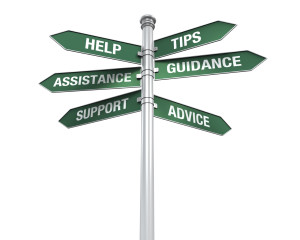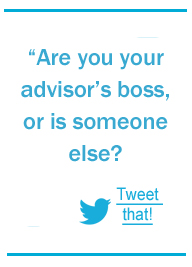By Noel D’Souza, CFP®
 Getting good financial advice in Canada is a tricky matter – trickier than it should be, in my opinion. The main challenges facing a seeker of financial advice come down to:
Getting good financial advice in Canada is a tricky matter – trickier than it should be, in my opinion. The main challenges facing a seeker of financial advice come down to:
- Can I find someone qualified to assist me with my particular needs?
- Can I rely on this person to have my best interests at heart?
- Are we a good fit to work together?
Given these challenges, what is a person to do?
As with so many things in life, being an informed consumer will serve you well. But again, there’s a bit of a Catch-22 here. There’s an inherent imbalance in knowledge when one is seeking advice of any kind. If you’re like me, think of the last time you visited a mechanic and were told “Your right rear differential thing-a-ma-jig is leaking fluid and needs to be replaced. It will take 2 hours and cost X $. Should I go ahead with the repair?”
Huh?!
After all, you’re seeking advice from an expert because you don’t have the knowledge and experience in that area, right? But there are a few basic principles to remember and questions to ask that will serve you well.
Training/education and experience
I recently spoke with Gail Bebee, a personal finance writer, speaker, and teacher, about decoding financial advisor titles and how one must take care when evaluating an advisor’s titles and credentials.
You can check out Gail’s article for the full breakdown on advisor titles and their relative value, but it’s important to know that the person advising you has sufficient training, knowledge, and experience to advise you on the issues that matter to you.
 One of the first questions to ask yourself is “Am I looking for an investment advisor/manager, or do I need a comprehensive financial planner?”
One of the first questions to ask yourself is “Am I looking for an investment advisor/manager, or do I need a comprehensive financial planner?”
These two roles are often confused, but they’re really quite distinct and require different skill sets.
If you’re looking for someone to manage your investments, including building a portfolio of specific investment products, then you’re probably looking for an investment advisor. An investment advisor is usually paid based on the investments you purchase or the total size of your account.
If, instead, you want advice regarding how best to manage your cash flow to minimize taxes, pay down debt efficiently and effectively, create a strategy to save and invest for your important short, medium, and long-term financial goals, understand the financial risks you face in life (beyond the manic/depressive stock market!) and how to address them, save for your kids’ education, retirement and an orderly transition of assets to your beneficiaries when you pass on, and generally build good money management habits so you won’t be constantly stressed about your money, you need a financial planner.
Questions to ask a prospective advisor:
- What is your background and experience? What are your professional designations? What associations are you a member of? How do I look you up with the organization?
- What services do you provide? In what areas can you advise me? In what areas can you not advise me?
Working in Your Best Interest
In May I had an extensive discussion with Money Coaches Canada CEO Karin Mizgala about the subject of fees and financial advice, and the importance of understanding the motivations of your advisor and whether the advisor’s interests are aligned with your own.
 An important principle to remember is that apart from volunteering, nobody works for free. If someone provides you with a product or service, you can bet they’re getting paid for it. You need to understand how they get paid and by whom. After all, the one who pays you is essentially “the boss”, and you have to keep the boss happy, right?
An important principle to remember is that apart from volunteering, nobody works for free. If someone provides you with a product or service, you can bet they’re getting paid for it. You need to understand how they get paid and by whom. After all, the one who pays you is essentially “the boss”, and you have to keep the boss happy, right?
Are you your advisor’s boss, or is someone else? Who does your advisor have to keep happy?
Questions to ask a prospective advisor:
- How do you get paid? Do you receive commissions or referral fees? Do you pay commissions or referral fees?
- Do you have a responsibility to put my interests ahead of your own, or those of your employer? Will you work in my BEST interest?
- What are your fees? What is included in the fees, and what is extra? Do you offer service beyond the creation of a financial plan (i.e. plan implementation support and regular reviews)? How does that work?
Are We a Good Fit?
You can find a very knowledgeable, well-accredited and experienced advisor whose interests are aligned with yours. However sometimes that just isn’t enough for a successful working relationship.
In dealing with matters as potentially intimate and sensitive as personal finances, it’s also very important to find someone you feel comfortable speaking with and with whom you can be open and honest about not only “the numbers”, but your hopes, dreams, fears, uncertainties. It’s important that your advisor acknowledges what is important to you and respects your values and choices.
NOTE: This is NOT the same thing as your advisor always agreeing with you or telling you what you want to hear. Your advisor sometimes has to confront you with inconvenient or uncomfortable truths – that’s his/her job, to advise you so you don’t get into trouble. For example:
- you’re spending more than you can afford and going further into debt
- you’re not saving enough for the retirement you say you want
- you really can’t afford the home/car you want to buy
 It’s important that you and your advisor have a working relationship where you can have challenging conversations and reach productive solutions. If your advisor is hesitant to advise you, or you are not open to his/her advice, why are you working together?
It’s important that you and your advisor have a working relationship where you can have challenging conversations and reach productive solutions. If your advisor is hesitant to advise you, or you are not open to his/her advice, why are you working together?
So make sure you find an advisor that is a good fit for YOU.
Questions to ask a prospective advisor:
- What type of clients do you typically work with? Have you worked with clients like me? (Be sure to tell them a bit about you so they can provide a reasonable answer!)
- Can you provide testimonials or references from past clients?
- How do you work with clients? In person/online/phone? How often do you meet? If you meet in person, where do you meet? When are you able to meet?
- How many clients do you work with at a time?
Get it in writing
The last question I would add, which goes with all of the above, is this:
Will you put this all in writing? (And then make sure your advisor actually does.)
 It’s important to have a written agreement laying out the important terms of your work together so there is no confusion, misunderstandings, he-said she-said, etc. A clear, easy-to-understand agreement that provides full disclosure of each party’s roles and responsibilities is vital in such an intimate arrangement as a client-advisor relationship. If you feel your advisor is not living up to their part of the agreement, bring it to their attention. A good advisor wants you to be happy with his/her service, and will take steps to address your reasonable concerns.
It’s important to have a written agreement laying out the important terms of your work together so there is no confusion, misunderstandings, he-said she-said, etc. A clear, easy-to-understand agreement that provides full disclosure of each party’s roles and responsibilities is vital in such an intimate arrangement as a client-advisor relationship. If you feel your advisor is not living up to their part of the agreement, bring it to their attention. A good advisor wants you to be happy with his/her service, and will take steps to address your reasonable concerns.
Finding the right financial advisor for you isn’t always easy, but once you do find that match, it is a relationship you will benefit from immensely, and for many years.

